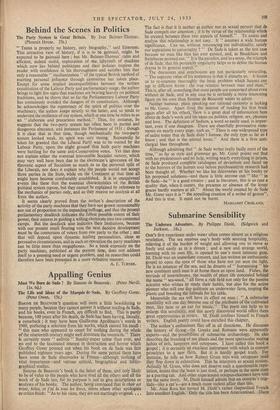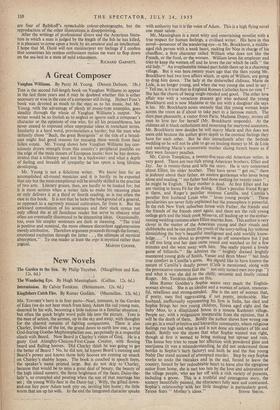Submarine Sensibility
The Undersea Adventure. By Philippe Diole, (Sidgwick and Jackson.. 18s.) ONE'S first experience under water often comes almost as a religious revelation. The sea receives one's body with seeming hospitality, relieving it of the burden of weight and allowing one to move as freely and easily as in a dream ; and a new and strange world, teeming with its own life, is opened to one's most intimate gaze. M. Diole was an immediate convert, and has written an enthusiastic gospel to open the eyes of those who have not yet seen the light. He is an amateur of the sea, and he dreams of " humanising " his new continent until man is at home there as upon land. Fishes, the myriads of invertebrates, the wealth of plant life concealed behind the name " sea-weed," all form a rich field not only for the passive scientist who wishes to study their habits, but also for the active pioneer who will one day cultivate an underwater farm, reaping the plants and breeding the animals for his table.
Meanwhile the sea will have its effect on man : " A submarine sensibility will one day become one of the attributes of the cultivated man, like taste or an ear for music." The poets can help us to enlarge this sensibility, and this newly discovered world offers them great opportunities in return. M. Diole confines himself to French writers. English poetry could have enriched this chapter.
The author's enthusiasm flies off in all directions. He discusses the history of diving—the Greeks and Romans were apparently experts—and the possibilities of submarine archaeology. He also describes the breeding of sea plants and the more spectacular mating habits of eels, lampreys and octopuses. I have called this book a gospel ; it is certainly ap excellent instrument with which to convert proselytes to a new faith. But it is hardly gospel truth. For instance, he tells us how Robert Gruss toys with octopuses until they flop down in exhaustion. This he interprets as sexual ecstasy. Actually M. Gruss, who does not deserve such a questionable repu- tation, insists that the beast is just tired, or perhaps in the same state as a purring cat. And other experienced octopus-charmers have told me the same story. M. Diole himself admits that an octopns's nup- tials—like a cat's—are a much more violent affair than this.
Mr. Alan Ross has turned M. Diole's rather rhapsodical French into excellent English. Only the title has been Americanised. There are four of Rebikoff's remarkable colour-photographs, but the reproduction of the other illustrations is disappointing.
After the writings of professional divers and the American litera- ture in which a man is judged by the length of the fish he has killed, it is pleasant to come upon a book by an amateur and an intellectual. I hope that M. Diole will Snot misinterpret my feelings if I confess that sometimes his restless enthusiasm makes me want to flop down on the sea-bed in a state of mild exhaustion.
RICHARD GARNETT.



























 Previous page
Previous page